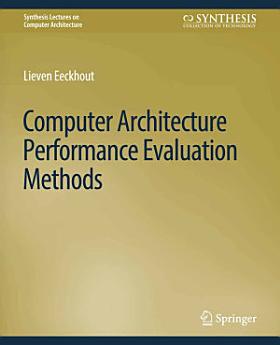Computer Architecture Performance Evaluation Methods
Lieven Eeckhout
May 2022 · Springer Nature
Ebook
132
Pages
reportRatings and reviews aren’t verified Learn More
About this ebook
Performance evaluation is at the foundation of computer architecture research and development. Contemporary microprocessors are so complex that architects cannot design systems based on intuition and simple models only. Adequate performance evaluation methods are absolutely crucial to steer the research and development process in the right direction. However, rigorous performance evaluation is non-trivial as there are multiple aspects to performance evaluation, such as picking workloads, selecting an appropriate modeling or simulation approach, running the model and interpreting the results using meaningful metrics. Each of these aspects is equally important and a performance evaluation method that lacks rigor in any of these crucial aspects may lead to inaccurate performance data and may drive research and development in a wrong direction. The goal of this book is to present an overview of the current state-of-the-art in computer architecture performance evaluation, with a special emphasis on methods for exploring processor architectures. The book focuses on fundamental concepts and ideas for obtaining accurate performance data. The book covers various topics in performance evaluation, ranging from performance metrics, to workload selection, to various modeling approaches including mechanistic and empirical modeling. And because simulation is by far the most prevalent modeling technique, more than half the book's content is devoted to simulation. The book provides an overview of the simulation techniques in the computer designer's toolbox, followed by various simulation acceleration techniques including sampled simulation, statistical simulation, parallel simulation and hardware-accelerated simulation. Table of Contents: Introduction / Performance Metrics / Workload Design / Analytical Performance Modeling / Simulation / Sampled Simulation / Statistical Simulation / Parallel Simulation and Hardware Acceleration / Concluding Remarks
About the author
Lieven Eeckhout is an Associate Professor at Ghent University, Belgium. His main research interests include computer architecture and the hardware/software interface in general, and performance modeling and analysis, simulation methodology, and workload characterization in particular. His work was awarded twice as an IEEE Micro Top Pick in 2007 and 2010 as one of the previous year's "most significant research publications in computer architecture based on novelty, industry relevance and long-term impact." He has served on a couple dozen program committees, he was the program chair for ISPASS 2009 and general chair for ISPASS 2010, and he serves as an associate editor for ACM Transactions on Architecture and Code Optimization. He obtained his Master's degree and Ph.D. degree in computer science and engineering from Ghent University in 1998 and 2002, respectively.
Rate this ebook
Tell us what you think.
Reading information
Smartphones and tablets
Install the Google Play Books app for Android and iPad/iPhone. It syncs automatically with your account and allows you to read online or offline wherever you are.
Laptops and computers
You can listen to audiobooks purchased on Google Play using your computer's web browser.
eReaders and other devices
To read on e-ink devices like Kobo eReaders, you'll need to download a file and transfer it to your device. Follow the detailed Help Center instructions to transfer the files to supported eReaders.




